What Types of Cockroaches Live in New England?

One of the most resilient pests are cockroaches. According to Census.gov, cockroaches have been spotted in about 10% of homes in the United States. These dirty insects can be found in almost all places, including restaurants, farms, offices and of course homes. Cockroaches are attracted to food, moisture, and dark, sheltered places. Here in New England, there are five different types of cockroaches that are commonly found, each of which we’ll touch on in this article. If you have any questions about cockroaches or are looking for a cockroach exterminator in Massachusetts or New Hampshire, please contact Absolut Pest Control today for a free estimate!
German Cockroach
German cockroaches are some of the most commonly found cockroaches in New England. German cockroaches are typically about ½” long, oval-shaped, and light brown in color. These cockroaches are not native to New England (or the United States in general), but have likely been here since the late 18th century. These cockroaches are highly allusive, and when an infestation begins, they often require professional extermination services to eradicate.
Brown-Banded Cockroach
Brown-banded cockroaches are another common cockroach species in the 6 New England states. Much like German cockroaches, brown-banded cockroaches are about ½” in length with brown, oval-shaped bodies. The easiest way to differentiate between these two cockroach species is that brown-banded cockroaches have two light brown-colored bands that wrap around their bodies. These cockroaches have been found in the USA since the early 1900s. Brown-banded cockroaches prefer warm environments, so you may find them in your home near appliances that give off heat.
Oriental Cockroach
Oriental cockroaches are larger and darker in color than the two above-mentioned roach species, as they are typically about 1” long and dark brown to black in color. These cockroaches prefer cooler, moist environments, so they are often found in drains, sewers, and under debris like wet leaves.
American Cockroach
American cockroaches are the largest cockroaches that are commonly found in New England, as they are typically at least 1 ½” long. These cockroaches are brownish-red in color with a light brown band behind their heads. Despite their name, American cockroaches are not native to the Americas; they are native to Africa and are believed to have been brought to the United States during the 1600s. Like oriental cockroaches, American cockroaches are often found in drains and sewers because they prefer dark, humid environments.
Smoky Brown Cockroach
Smokey brown cockroaches are a shiny, brownish-black roach species that are typically 1”-1 ½” in length. These cockroaches are often confused for American cockroaches because of their similar appearance, but smoky brown cockroaches do not have the light brown band behind their heads that American cockroaches do. Smoky brown cockroaches are most commonly found outdoors in leaf piles, mulch, and other dead organic matter.
Contact Absolut Pest Control For Cockroach Extermination Services!
If you have any questions about cockroaches or are currently experiencing a roach infestation at your Massachusetts or New Hampshire home or business, please contact our team at Absolut Pest Control today! We provide home and business owners in MA & NH with a wide range of affordable pest removal & extermination services! Get a free pest control estimate today by calling us at (978) 388-4589 or by filling out the contact form on our website!
Four Common Treatment Methods For Termite Infestations

Just hearing the word “termites” is probably enough to make your skin crawl. Even worse, the thought of these insects should be enough to make you shudder when you consider the damage that termites can do to your home or commercial property. These little pests can cause thousands of dollars worth of damage to your house or building, requiring expensive, time-consuming repairs if an infestation is not caught and treated quickly enough! In this article, we’ll offer you some tips on termite prevention strategies and talk about the different methods for treating a termite infestation! If you are a home or business owner in Massachusetts or Southern New Hampshire that is currently worried about a termite problem, contact our team at Absolut Pest Control today for a free termite control estimate!
How To Prevent Termites From Invading Your Property
Termite control starts with prevention, so it’s important to think about what you can do to keep termites from creating damage in the first place. Here are a few termite prevention tips to help you get started:
- Fix water leaks as soon as they are identified.
- Avoid planting trees, shrubs, and other landscaping too close to your home or building.
- Refrain from stacking firewood or other wood products directly against your home.
Termites are attracted to moisture and wood, so limiting their access to these two things is essential for preventing infestations.
Termites thrive in damp, concealed environments, so maintaining a dry and well-ventilated space can significantly reduce the risk of infestations. You can also deter these pests by ensuring that wood structures are properly treated and not directly touching the ground. Regular inspections can also catch signs of termite activity before they become a bigger problem!
Common Treatment Methods For Termite Infestations
If termites have made their way to your home or building and are creating damage despite your best efforts, it’s time to take more aggressive measures. This is where professional treatment often comes into play. The most common treatment methods for termite infestations are:
- Bait Treatments: This method involves installing bait stations around your property to lure termites in. Once termites feed on the bait containing slow-acting insecticide, they return to the colony, eventually eliminating the entire group.
- Liquid-Soil Treatments: Liquid-soil treatments around your home’s foundation create a chemical barrier that kills termites on contact. This method effectively prevents termites from entering the home.
- Pre-Treated Materials: Using wood and other building materials treated with termiticides can prevent termites from ever becoming a problem.
- Wood Treatments: This involves applying termiticides directly to the wood surfaces in your home. It can be used as a preventative measure or to treat existing infestations. This treatment makes the wood toxic and less appealing to termites.
Each of these termite treatment methods has advantages, and a professional can assess your specific situation to recommend the most effective treatment for your property. Trusting a professional ensures that the job will be done right and that your home will be protected from further damage! For a free estimate on termite control services in Massachusetts & New Hampshire, contact our team at Absolut Pest Control today!
Contact Absolut Pest Control For Termite Extermination in Massachusetts!
If you need assistance identifying, preventing, or treating a termite infestation in your Massachusetts or Southern New Hampshire home, please contact our team at Absolut Pest Control today for a free termite inspection and control estimate! We provide various pest removal and extermination services at affordable prices throughout the region! Give us a call today at (978) 388-4589 or fill out the contact form on our website to get a free estimate!
How Are Bed Bug Infestations Treated?

Bed bugs are some of the worst pests that you can face a problem with because they can be extremely difficult to get rid of once an infestation begins. Bed bugs often enter homes by hitching a ride on clothes, in suitcases, and on used furniture. Once in the home, bed bugs will find hiding spots in mattresses, couches, carpets, and clothing. When bed bugs bite, they leave raised red bumps in a line or zig zag pattern. If you’ve ever woken up with several itchy or burning bumps on your body, bed bugs could be the culprit. In this article, we’ll discuss how bed bug infestations are professionally treated, from inspection to extermination! If you believe that you have a bed bug infestation in your home in Massachusetts or New Hampshire, contact Absolut Pest Control today for a free bed bug extermination estimate!
Inspection
The first step in solving a bed bug infestation is an inspection to determine the severity of the problem. A pest control professional will thoroughly inspect your furniture, carpets, mattresses, and other areas where bed bugs may be hiding in order to determine what will be the most effective treatment method.
Preparation
Once the inspection has been completed and the extermination strategy has been determined, the next step is to prepare the home for the chosen bed bug treatment. Preparation typically includes washing clothes and linens, vacuuming, and moving items out of the house that don’t need to be treated.
Treatment
After inspecting and preparing the home, the pest control professional can begin treating the bed bug infestation using the method that has been chosen. Some of the most common bed bug infestation extermination methods include chemical treatment, heat treatment, and steam treatment. Chemical treatment involves the application of insecticides on infected areas like the cracks and crevices in furniture. Heat treatment involves raising the temperature in the home to a degree in which the bed bugs can not survive (113°F for 90 minutes). Finally, steam treatment involves the application of hot steam to infested areas, killing the bed bugs on contact.
Contact Absolut Pest Control!
If you have any questions about bed bugs or are currently experiencing a bed bug infestation at your Massachusetts or New Hampshire home, please contact our team at Absolut Pest Control today! We provide home and business owners in MA & NH with a wide range of affordable pest removal & extermination services! Get a free pest control estimate today by calling us at (978) 388-4589 or by filling out the contact form on our website!
What Are The Differences Between Drywood & Subterranean Termites?
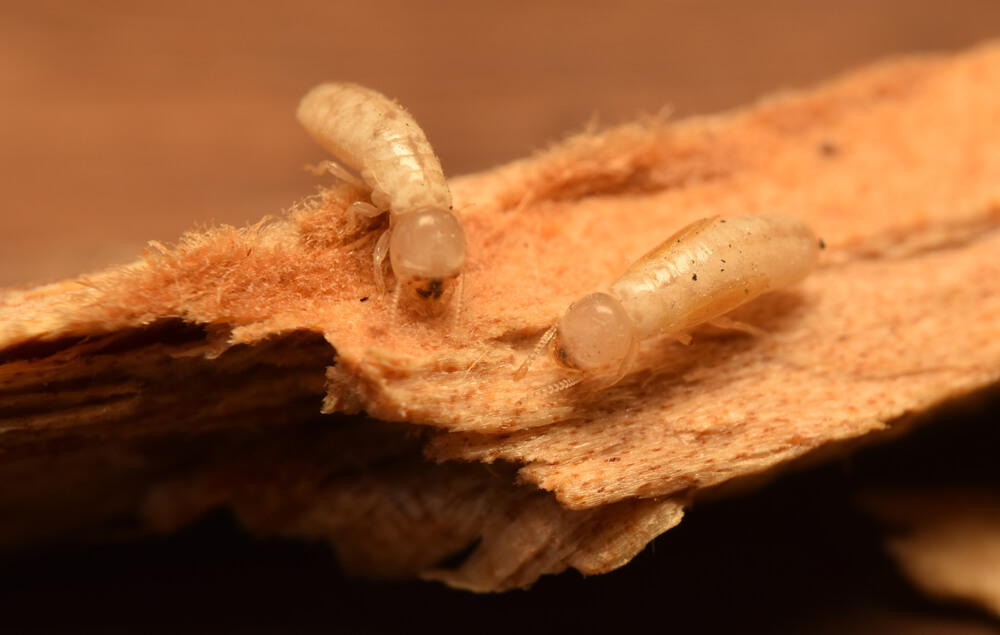
While many insects are mostly harmless and are usually only disliked by humans because of fears or annoyances, termites present some serious problems for property owners. Termites will destroy wooden structures and can lead to serious property damage if left unchecked. In the United States, there are two main categories of termites: drywood termites and subterranean termites. In this article, we will discuss some of the differences between these two types of termites and what it means for you! If you are a home or business owner in Massachusetts or Southern New Hampshire that is currently struggling with a termite problem, contact our team at Absolut Pest Control today for a free termite control estimate!
Drywood vs. Subterranean Termites
One of the primary differences between drywood and subterranean termites is that drywood termites nest in the wood they are eating away at, while subterranean termites live underground. Subterranean termites typically enter homes and buildings through “mud tubes”, which are pencil-sized tunnels of mud that stretch vertically from the ground to the wood on a house or building.
What Type Of Termite Causes More Damage?
Subterranean termites typically have the ability to cause more damage than drywood termites, partially due to the fact that their colony sizes are much larger. Subterranean termites can also damage properties faster due to their colony sizes, sometimes causing significant damage to houses and buildings before the infestation is even noticed.
How Do You Get Rid Of Termites?
There are multiple different treatment methods for drywood and subterranean termites. For drywood termites, the most common treatment methods include fumigation, insecticides, heat treatment, and spot wood treatment, which involves injecting specific chemicals into the wood where drywood termites are living. For subterranean termites, the two most common treatment methods are liquid soil treatment and bait stations. Liquid soil treatments involve putting a barrier of termiticide around the perimeter of the house or building, and bait stations involve putting out poison bait for the termites that will be spread throughout the colony.
Contact Absolut Pest Control For Termite Control Services in Massachusetts!
If you need assistance identifying, preventing, or treating a termite infestation in your Massachusetts or Southern New Hampshire home, please contact our team at Absolut Pest Control today for a free termite inspection and control estimate! We provide various pest removal and extermination services at affordable prices throughout the region! Give us a call today at (978) 388-4589 or fill out the contact form on our website to get a free estimate!
Carpenter Ants: Identification, Prevention, & Control
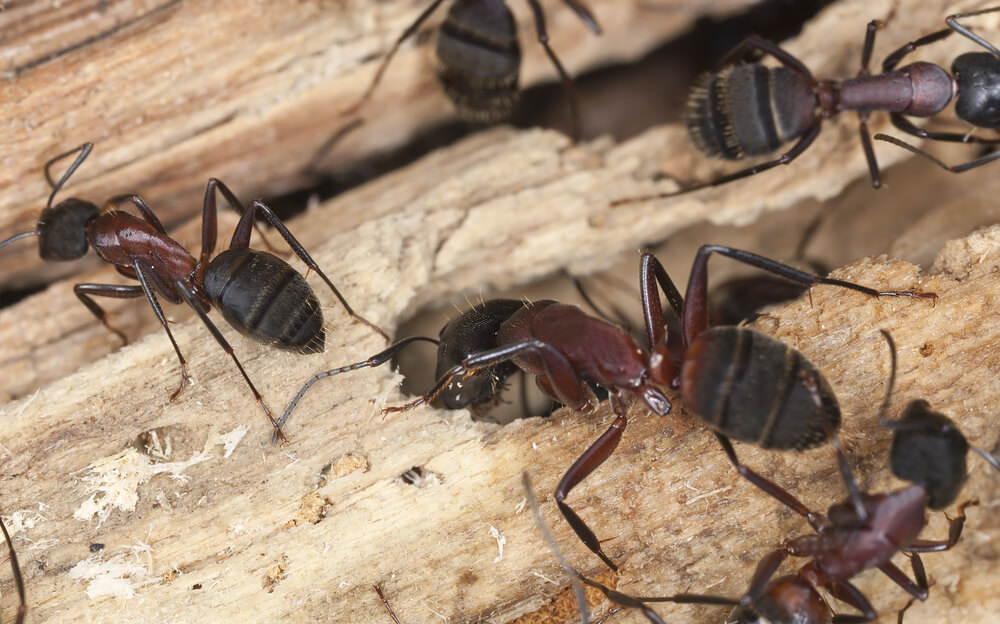
Most people know about the dangers of termites and how they can cause significant damage to the wooden structures in a home, but there is another wood-damaging insect that you should be keeping your eye out for: carpenter ants! While carpenter ants are typically not quite as destructive as termites, they can still cause thousands of dollars in damages when they infest your home and tunnel through wooden doors, window frames, porches, joists, beams, and more. In this article, we’ll offer some tips on how you can identify, prevent, and control carpenter ant infestations! If you have any questions about carpenter ants or are a Massachusetts homeowner that would like a free estimate on a carpenter ant control service, please contact our team at Absolut Pest Control today by calling us at (978) 388-4589!
Carpenter Ant Identification
Spotting a carpenter ant isn’t too tough if you know what to look for. Carpenter ants tend to be larger than common black ants, usually measuring ½” to ⅝” long. Color-wise, they can range from jet black to a dark brownish red. What sets them apart from other ants, physically, are their smooth, rounded backs, which is unlike other ants that tend to have a more uneven silhouette.
If you notice a fine, sawdust-like material near wooden structures in your home, it can be a telltale sign of a carpenter ant infestation. They leave behind this debris, known as frass, as they tunnel through wood. If you’re noticing any signs of carpenter ants in your home, it’s important to contact a pest control professional as soon as possible!
Causes & Risks Of Carpenter Ant Infestations
Carpenter ants don’t need an invitation to enter your home. They work their way in through cracks and crevices around windows, doors, and electrical holes. These small insects also have an uncanny ability to crawl along tree limbs, shrubs, and even overhead wires, quickly making their way into your home. Some of the most common causes of carpenter ant infestations include:
- Moisture Problems: Areas with persistent moisture or water damage, such as leaky roofs, pipes, and damp basements, are prime real estate for carpenter ants.
- Old, Rotting Wood: If your home has old, decayed wood in structures, decks, or landscaping, it’s like rolling out the welcome mat for these pests.
- Cracks and Openings: Small openings around windows, doors, and foundation cracks provide perfect entry points for carpenter ant colonies.
- Nearby Vegetation: Overhanging tree branches or plants in contact with your home’s structure can serve as bridges for carpenter ants to enter your residence.
- Stored Firewood or Lumber: Stacks of firewood or lumber that are kept close to your home can harbor carpenter ants, making it easy for them to transition from the woodpile to your living spaces.
How To Prevent & Control Carpenter Ant Infestations
The best way to prevent carpenter ant infestations is to make your home less attractive to them. This means controlling moisture and sealing those cracks and crevices that we mentioned above. Furthermore, be sure to stay on top of routine home maintenance as your home is at greater risk for an infestation if it is not properly kept up. Be sure to keep vegetation from getting too close to your home, as this creates the perfect vehicle for carpenter ants to make their way in.
Even if you’re doing everything right to try to prevent these wood-damaging insects from entering your home, they may still find their way in. The best way to control a carpenter ant infestation is to contact a professional with extensive experience dealing with these wood-damaging pests. If you’re a home or business owner in Massachusetts that is currently experiencing a problem with carpenter ants, contact our team at Absolut Pest Control today to get a free carpenter ant control estimate!
Contact Absolut Pest Control!
If you need assistance identifying, preventing, or treating a carpenter ant infestation in your Massachusetts or Southern New Hampshire home, please contact our team at Absolut Pest Control today for a free estimate! We provide various pest removal and extermination services at affordable prices throughout the region! Give us a call today at (978) 388-4589 or fill out the contact form on our website to get a free estimate!
Everything You Need To Know About Carpenter Bees
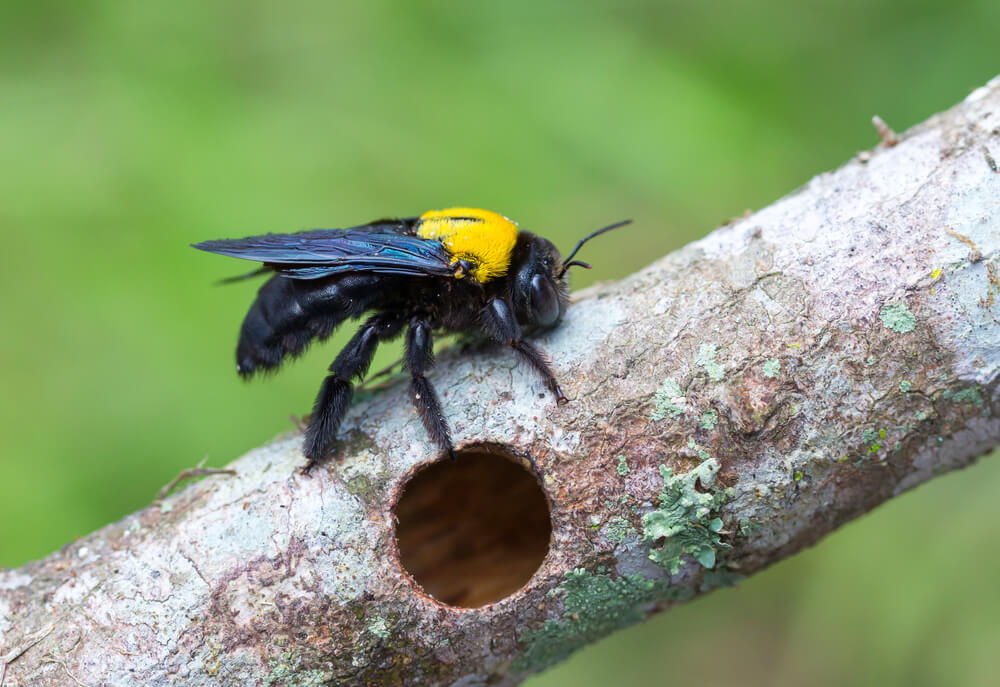
Carpenter bees are a large, black and yellowish-orange species of bee that are active from the early spring through the early fall. Carpenter bees are significantly larger than honey bees and are often mistaken for bumblebees due to their similar size and appearance. These bees like making their nests in wooden structures like houses, causing thousands of dollars worth of damage. In this article, we’ll talk about how you can identify carpenter bees, how they can damage your home, and how you can keep an eye out for them! If you have any questions about carpenter bees or are a Massachusetts resident that would like a free estimate on a carpenter bee control service, please contact our team at Absolut Pest Control today by calling us at (978) 388-4589!
Carpenter Bee Identification
As mentioned above, carpenter bees are relatively large bees that are often mistaken for bumblebees due to their size and appearance. Carpenter bees can be easily differentiated from bumblebees because they have shiny, non-hairy abdomens, while bumblebees have a dense layer of fur that covers almost all of their bodies. Another way to identify carpenter bees is by paying attention to their behavior. Carpenter bees will often hover around the exterior of homes and land on untreated wood, where they like to create holes and tunnels where they can lay their eggs.
How Carpenter Bees Can Damage Your Home
Carpenter bees that survive the winter here in Massachusetts will emerge from hibernation in the spring and begin to mate. Fertilized female carpenter bees will then immediately look to build their nests where they can safely lay their eggs, and oftentimes, they choose to dig their nests in your house’s siding, deck, roof, or other wooden structures. Carpenter bees prefer to excavate their nests in unpainted, untreated softwoods. When your home is repeatedly targeted by carpenter bees, its structural integrity can be damaged and cost you thousands of dollars in repairs, similar to the damage that termites and carpenter ants can cause.
Signs Of A Carpenter Bee Infestation
The easiest way to spot a carpenter bee infestation is to keep a lookout for the damage they cause on the wooden surfaces on and around your home. Carpenter bee damage looks like round, smooth holes that have a diameter about the size of your pinky finger. Once they have accessed the inside of the wood through these holes, carpenter bees will make a sharp turn where they will continue to burrow parallel to the surface, creating damage that is much larger than it may appear to the naked eye. In order to prevent harmful carpenter bee damage, you should regularly inspect the exterior of your home for these smooth, round holes in the spring, summer, and early fall!
Contact Absolut Pest Control!
If you have any questions about identifying, preventing, or treating a carpenter bee infestation in your Massachusetts or Southern New Hampshire home, please contact our team at Absolut Pest Control! We provide various pest removal and extermination services at affordable prices throughout the region! Give us a call today at (978) 388-4589 or fill out the contact form on our website to get a free estimate!
How To Prevent Earwig Infestations In Your Home
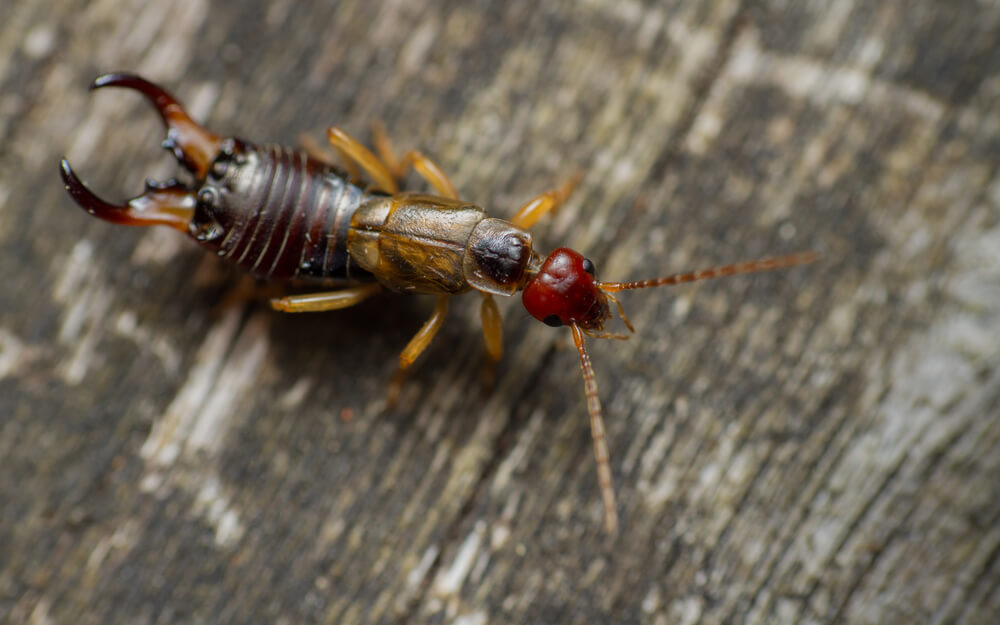
Earwigs are a menacing-looking insect due to the large pincers that are located on the back side of their abdomen, but these pests are harmless for the most part. Legend has it that earwigs got their name from the suspicion that they would crawl into people’s ears when they sleep, but this rumor has no scientific basis and is most likely false. Even though earwigs are not particularly harmful, they are still an unsanitary insect that you should aim to keep out of your home or business! In this article, we’ll offer you some tips on how to prevent earwig infestations in your home! If you have any questions about earwigs or would like a free estimate on an insect control service at your Massachusetts or New Hampshire home, please contact our team at Absolut Pest Control today!
Limit Excess Moisture In Your House
Earwigs are attracted to moist, secluded environments, so one of the best ways to prevent infestations in your home is to limit any excess moisture in cabinets, basements, bathrooms, etc. If you’ve noticed earwigs in your home recently, you should perform a thorough inspection for pipe leaks or other sources of moisture that may be attracting these insects.
Seal Gaps & Cracks In Foundation & Walls
Earwigs’ most common entry point into homes is through cracks, gaps, or holes in the walls or foundation of the home. Sealing up these cracks with caulking or liquid cement is an excellent way to prevent earwig infestations, but can also prevent infestations from a wide range of other insects and rodents.
Landscaping Around Your Home
One more way to prevent earwig infestations in your home is to be vigilant about the landscaping in your lawn. As mentioned above, earwigs are attracted to moisture, so removing moisture-filled items from the perimeter of your home can help prevent infestations inside. Be sure to clean up leaf piles, trim back vegetation, and store wood piles at least 10 feet from your house!
Contact Absolut Pest Control!
If you have any questions about preventing earwig infestations or are currently experiencing a pest problem at your Massachusetts or New Hampshire home, please contact our team at Absolut Pest Control! We provide home and business owners in the region with a wide range of affordable pest removal & extermination services! Contact us today to get a free estimate by giving us a call at (978) 388-4589 or by filling out the contact form on our website!
Tips On Pest-Proofing Your Home For The New England Winter
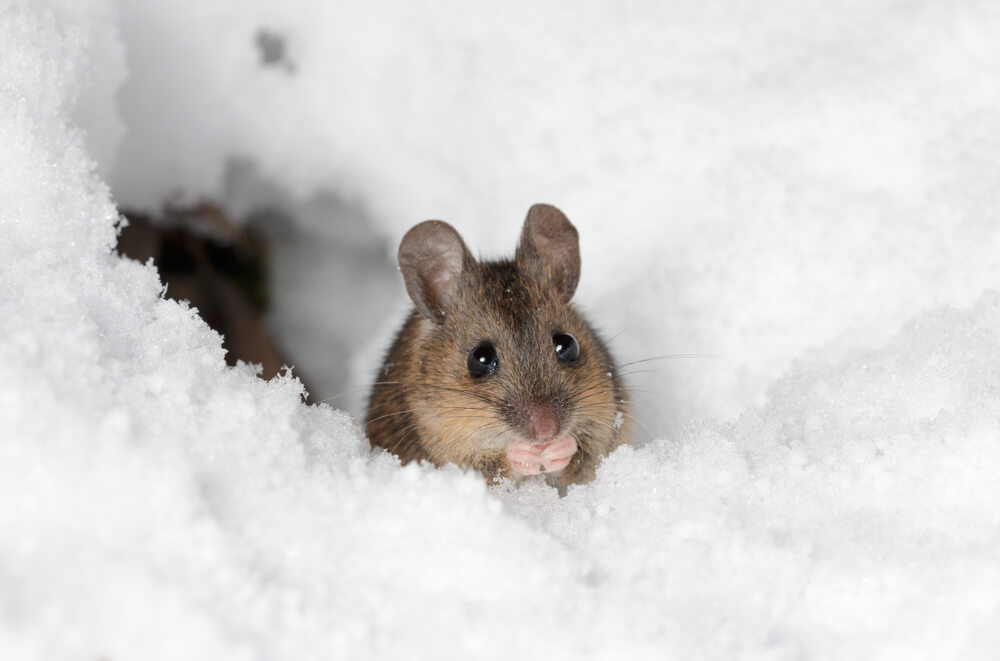
The cold wintertime in New England can drive a wide range of pests into your home that are seeking shelter. Some of the most common winter pests in New England and the surrounding regions are rodents, carpenter ants, cockroaches, stink bugs, ladybugs, bed bugs, earwigs, and more. In this article, we’ll give you some tips on how you can prepare your home for the wintertime in order to prevent pest infestations from rodents, insects, and more! If you have any questions about pest prevention or are currently experiencing a problem with any kind of pest at your northeastern Massachusetts or southern New Hampshire home, please contact our team at Absolut Pest Control today for a free pest control estimate!
Seal Gaps & Cracks Around The Exterior Of Your Home
One of the best ways to prevent rodent and insect infestations in your home during the wintertime is to ensure that these pests can never enter the house in the first place! To do this, you should perform a thorough inspection of your house’s foundation, doors, windows, and siding. If you notice any cracks or gaps anywhere on the exterior of your home, you should be sure to seal them up in order to prevent pests from entering through them. Even if the crack or gap seems insignificant, they should still be sealed, as adult mice can squeeze through spaces that are only about the size of a dime. In order to seal off cracks and gaps, you can use screens, caulking, spray foam, steel wool, and more.
Landscaping Around Your House
Another great way to prevent pest infestations during the wintertime is to keep up with the landscaping around the exterior of your house. You should be sure that any tree branches around your house are trimmed back to at least 10 feet from your roof, as they can act as a bridge for insects and rodents. Additionally, piles of firewood should be placed at least 5 feet from your home’s walls, as pests living in these stacks could otherwise gain easier entry into your house. Finally, be sure to properly deal with the leaves that fall from the trees around your house, as pests often live and hide underneath debris. Rake your yard regularly to keep up with leaves and clean out your gutters!
Properly Dispose Of Garbage
One more way to prevent pest infestations this winter is to be vigilant about the way you store and dispose of your trash. Improper garbage storage is one of the most surefire ways to attract pests to your home, especially during the wintertime when pests’ typical food sources are more scarce. Be sure that your trash and recycling bins have tight fitting lids that are being utilized while the trash is still in your home and while it’s on the curb awaiting pickup, as rodents and small mammals like raccoons may try to break into your trash cans to find an easy meal. You should also be sure to regularly clean your trash cabinets in order to pick up any spills and crumbs that may be attracting ants, mice, and other pests!
Contact Absolut Pest Control!
If you have any questions about preventing pest infestations in the wintertime or are currently experiencing a pest problem at your Massachusetts or New Hampshire home, please contact our team at Absolut Pest Control! We provide home and business owners in the region with a wide range of pest removal & extermination services at affordable prices! Contact us today to get a free estimate by giving us a call at (978) 388-4589 or by filling out the contact form on our website!
What Are Powderpost Beetles?

“Powderpost beetle” is a term that refers to several species of beetles that tunnel through wood, damaging the structural integrity of whatever they are attacking. There are three different families of beetles that can be classified as powderpost beetles: Lyctidae, Bostrichidae, and Anobiidae. Because powderpost beetles are wood damaging insects, they are often mistaken by homeowners for termites or carpenter ants when they begin to attack a house. Without actually being able to see the beetles themselves, the best way to differentiate powderpost beetle infestations from other wood-damaging insects is to look at the damage they’ve caused. Powderpost beetles create narrow, circular tunnels in the wood they are burrowing through, leaving behind a powdery, sawdust-like material. Below, we’ll dive deeper into the three main types of powderpost beetles so that we can help you identify the insects that are damaging your home! If you have any questions about powderpost beetles or are a Massachusetts homeowner that is currently struggling with a wood-damaging insect problem, please contact our team at Absolut Pest Control for a free pest control & extermination estimate!
Lyctid Powderpost Beetles
Lyctid powderpost beetles are typically 1/16-1/4 inch long with reddish-brown bodies. Lyctid powderpost beetles most commonly target newly manufactured products with wood that is less than five years old, and infestations are often caused by wood that already contained eggs or larvae at the time the product our house was built. Lyctid beetle infestations are especially common in tropical hardwoods, as the storage and drying process for these types of woods prior to their arrival in the USA can attract the insects.
Bostrichid Powderpost Beetles
Bostrichid powderpost beetles range in size from 1/8-1/4 inch long with elongated, cylindrical bodies. While these beetles are similar in color to Lyctid powderpost beetles, they can be differentiated by their downward-facing heads and rough-textured thorax. Bostrichid powderpost beetles target both seasoned softwood and hardwood, and their damage can often be found in unfinished hardwood flooring, furniture, & other wood products with high starch and moisture content.
Anobiid Powderpost Beetles
Anobiid powderpost beetles are the most dangerous family of powderpost beetles that homeowners can face a problem with because they can seriously damage homes by tunneling through beams, joists, and other essential structural elements of houses. These beetles have similar appearances to the other powderpost beetles mentioned above, but their life cycle is significantly longer, sometimes lasting up to ten years. Anobiid powderpost beetle damage can be found in both hardwood and softwood products like subflooring, plywood, paneling, molding, flooring, and furniture.
Contact Absolut Pest Control!
If you have any questions about identifying, preventing, or treating a powderpost beetle infestation in your Massachusetts or Southern New Hampshire home, please contact our team at Absolut Pest Control! We provide various pest removal and extermination services at affordable prices throughout the region! Give us a call today at (978) 388-4589 or fill out the contact form on our website!
What Diseases Do Mice Carry & Spread?
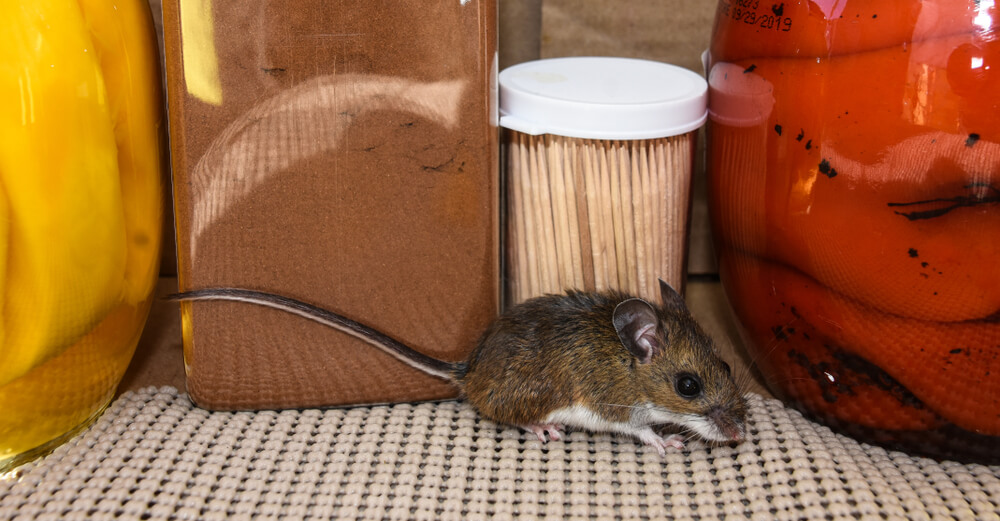
Mice are the most common rodents to enter residences and cause problems for the people that live there, making them a nuisance for homeowners throughout the United States. In addition to property damage that mice can cause by chewing through wood, drywall, wiring, and more, these little rodents can spread a wide range of diseases that can be harmful to you, your family, and your pets! In this article, we’ll talk about some of the diseases that mice carry and can spread to you when they are living in your home! If you are a Massachusetts or New Hampshire homeowner that is currently struggling with a rodent infestation, please contact our team at Absolut Pest Control today for a free extermination estimate!
Hantaviruses
One of the most common types of diseases that mice carry and spread are hantaviruses. Hantaviruses are a family of viruses that are spread primarily by rodents in the US, specifically by deer mice, white-footed mice, cotton rats, and rice rats. Hantaviruses are commonly spread to people when they are in the presence of rodent dropping and urine. Some common symptoms of hantaviruses include headaches, fevers, and muscle pain. If hantaviruses are left untreated, they can lead to other serious health problems.
Salmonellosis
Salmonellosis is a bacterial disease caused by the ingestion of a bacteria called salmonella. While salmonellosis is best known for being caused by eating raw chicken, it can also be caused by eating foods that have been contaminated by rodent feces. When mice get into the food storage in your home, your family is at risk for being exposed to salmonella. Symptoms of salmonellosis include diarrhea, abdominal pain, fever, and other flu-like symptoms.
Leptospirosis
Leptospirosis is a bacterial disease that is spread through the urine of infected animals, like mice. When a mouse that carries the leptospira bacteria urinates in your water or food supply, the disease can be spread to you. Leptospirosis symptoms include fevers, headaches, chills, vomiting, abdominal pains, and more.
Rat Bite Fever
Rat bite fever is a disease caused by consuming food or water that has been contaminated with streptobacillus moniliformis, a bacteria that is carried by mice, rats, and other rodents. As the name would suggest, rat bite fever can also be caused by bites or scratches from rodents that carry the disease. Rat bite fever typically causes a red, bumpy rash on the hands and feet.
Contact Absolut Pest Control
If you have any questions about mice, the diseases they carry, or believe that you have an infestation in your Massachusetts or New Hampshire home, please contact Absolut Pest Control! We provide various pest removal & extermination services at affordable prices throughout the region! Contact us today by giving us a call at (978) 388-4589 or by filling out the contact form on our website!
